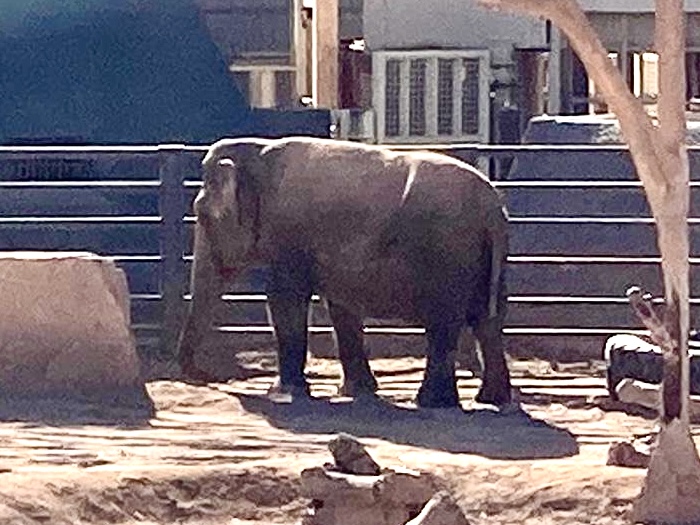In the heart of the Arizona desert, a growing movement of animal advocates is calling for a long-overdue act of compassion: the release of Indu, a solitary elephant at the Phoenix Zoo, to a spacious and naturalistic sanctuary where she can finally live among her own kind.
At Sustainable Action Now, we stand in full support of this urgent campaign, amplifying the voices of those speaking out for Indu, and calling for a future where elephants—highly social, emotionally intelligent beings—are no longer kept in isolation in urban zoos.

Indu’s story is emblematic of a larger issue plaguing zoos across the country: the inability to meet the complex physical, emotional, and social needs of elephants in captivity. This is a call not only to free Indu but to rethink how we treat captive wildlife in a society that claims to value animal welfare.
Who is Indu?
Indu is a female Asian elephant who has spent much of her life in captivity—decades of it, in fact. After arriving at the Phoenix Zoo in 1994, she has lived primarily alone, confined to a small exhibit in a dry, hot environment that is vastly different from the humid forests where her species thrives.
Elephants are deeply social creatures, living in tight-knit herds, forging lifelong bonds, and communicating through a complex system of vocalizations and vibrations. Isolation is devastating for them—both physically and psychologically. In the wild, Indu would be surrounded by family. In the zoo, she has none.
Despite this, she has been kept in solitary confinement for years, with the Phoenix Zoo resisting calls to relocate her to a more appropriate environment. But now, activists and experts alike are renewing their demand for Indu’s release to a legitimate elephant sanctuary, where she can spend her remaining years in peace and companionship.
Why Sanctuaries Are the Humane Alternative
Sanctuaries like The Elephant Sanctuary in Tennessee or PAWS (Performing Animal Welfare Society) in California offer expansive acreage, natural vegetation, mud wallows, enrichment, and—most importantly—other elephants.
In contrast, even the best zoo exhibits fall short. Captivity in a zoo limits the range of movement, suppresses natural behaviors, and often leads to chronic health conditions such as arthritis and foot infections—two of the leading causes of death in captive elephants.
More than 30 elephants have already been retired to sanctuary in the U.S., where they are now living healthier, more fulfilling lives. Indu deserves the same.
👉 Learn more about elephant welfare and our campaign to help Indu
The Case Against Keeping Elephants in Zoos
Keeping elephants in captivity has long been under fire by conservationists and scientists. According to numerous studies:
- Captive elephants suffer from stress-induced behaviors like swaying, rocking, and head-bobbing.
- Lack of adequate space leads to obesity, poor joint health, and reproductive problems.
- Social deprivation causes depression and cognitive decline.
The Association of Zoos and Aquariums (AZA) has even raised its standards over the years, encouraging more natural enclosures and recommending against housing elephants alone. Yet, the Phoenix Zoo continues to house Indu solo, a direct contradiction to these standards.
What Activists Are Doing—and How You Can Help
Local and national animal welfare advocates have launched petitions, staged peaceful protests, and held educational campaigns to raise awareness about Indu’s plight. Organizations are urging the Phoenix Zoo to do the right thing by retiring Indu to a sanctuary equipped to meet her needs.
Here’s how you can join the movement:
- 🐘 Sign petitions demanding Indu’s release
- 📣 Share her story on social media using #FreeIndu
- 🧾 Email or call the Phoenix Zoo leadership respectfully urging action
- 💬 Engage your community in conversations about wildlife ethics and captivity
- 👉 Support Sustainable Action Now’s elephant advocacy work
A Better Life Is Possible—for Indu and Others Like Her
This campaign is not just about one elephant. It’s about redefining our relationship with wild animals in captivity. Elephants do not belong behind glass walls or in enclosures surrounded by concrete. They deserve forests, freedom, and family.
With public pressure mounting and a growing understanding of elephant intelligence and sensitivity, now is the time for the Phoenix Zoo to act. Indu deserves to spend her final years with dignity, in a sanctuary that offers healing, companionship, and the space to just be an elephant.
Let’s make that vision a reality—together.
🐘💚🌿
👉 Help us free Indu and protect elephants worldwide
Sources:
- Sustainable Action Now – Elephant Advocacy
- The Elephant Sanctuary in Tennessee
- AZA Accreditation Standards & Elephant Guidelines
- Independent Veterinary Assessments on Captive Elephant Welfare
- Voices for Indu Local Advocacy Group


